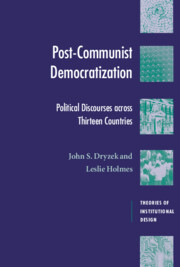Book contents
8 - Armenia
Published online by Cambridge University Press: 22 September 2009
Summary
Like many other countries analyzed in this book, Armenia had little experience with democracy prior to the 1990s. It has also experienced identity problems relating to its frequently changing boundaries over the centuries and to its relationships with other states. As Offe (1991) has argued, creating a new political system is much more difficult for a country whose boundaries are still contested.
Armenia was partitioned in the seventeenth century, with the western part (basically Anatolia) coming under Turkish (Ottoman) control, the eastern part under Persia's. The latter part was annexed by the Russian Empire in 1828, becoming a province. In 1917, it joined Georgia and Azerbaijan in an anti-Bolshevik federation; but this soon collapsed, and Armenia declared its independence in 1918. A brief democratic experiment ended in September 1920 when Turkey (now under Ataturk) attacked Armenia, countered by Russian troops. By November 1920, a new Soviet Republic of Armenia had been created. Armenia lost additional territory to Azerbaijan in the 1920s, which led to trouble in the 1990s.
Identity problems also arise in connection with religion. The Armenians were the first nation officially to adopt Christianity; in 2001, the country celebrates the 1700th anniversary of this. But Armenia is surrounded on three sides by Muslim countries – Azerbaijan to the east, Iran to the south, and Turkey to the west. Its northern neighbor, Georgia, is Christian, but of the Orthodox variety, whereas Armenia is Apostolic.
- Type
- Chapter
- Information
- Post-Communist DemocratizationPolitical Discourses Across Thirteen Countries, pp. 133 - 146Publisher: Cambridge University PressPrint publication year: 2002



